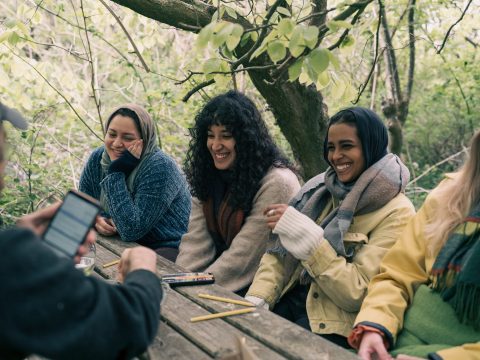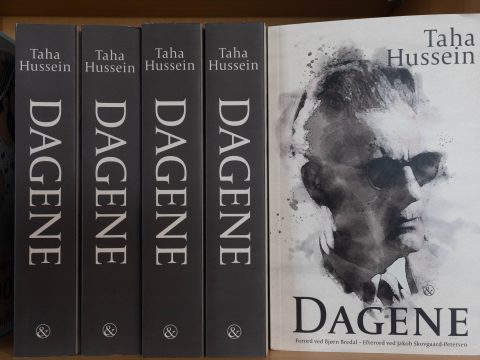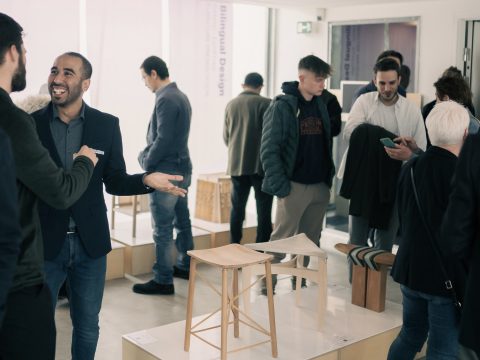
Meet the filmmakers
March 10, 2022
Taha Hussein in Danish
March 27, 2022By Elisabeth Vang Jørgensen
“Stop focusing on the darkness, focus on the light,” an Egyptian friend told the Danish film director Christian Suhr one night in Cairo back in 2014. Christian Suhr had been talking with his friend about the horrors taking place and dominating the media. At the time he was carrying out research on the relation between Muslims and non-Muslims in Europe, processes of radicalization and integration problems.
Christian Suhr decided to follow the advice and embarked on a journey that took him from the Danish town of Aarhus to Egypt and then back to Aarhus. Now, eight years later, the premiere of his documentary film Light Upon Light is set to take place at one of the world’s most prestigious documentary film festivals, the CPH:DOX, on March 24.
DEDI has been supporting the production, so we invited Christian Suhr and the production team for a traditional Egyptian breakfast and a talk about Light upon Light and the upcoming premiere.
Celebrations in Humaithara
Sitting around the table along with Christian Suhr were the cinematographer Amira Mortada, the editor Muhammad Mustapha, and the producer, filmmaker Hala Lotfy from the Cairo-based film collective Hassala Films.

“The film is about the human desire for light, healing and love and is documenting a process that ended up as a beautiful collaboration with Amira, Muhammad and Hala,” Christian Suhr says.
While making the documentary, Christian Suhr and his production team also became personally involved and are present in the film. The film documents their journey through the Egyptian capital, along the Nile, and into the desert. It is a search for answers; what is light, what does it do, how can there be so much darkness and light in this world and inside ourselves, what is the significance of the light that people experience in the midst of rituals, in their everyday lives, and in their dreams?
“Being in the editing room and trying to make the right decisions for the film was really challenging,” editor Muhammad Mustapha says, reflecting on his dual role. “As we looked over some of the raw footage in 2022, I found myself not always agreeing with what I said back in 2019.”

The documentary is shot in Denmark and Egypt. At one point in Egypt, Christian Suhr travels to Humaithara, deep in the southeastern desert to attend the yearly feast, celebrating the birthday of Abu El-Hassan Al-Shazly, the founder of the Shazly Sufi Order. During the event hundreds of thousands gather to express their love for the shaykh through prayers, songs, and rituals.
Insiders and outsiders
In his previous work, Christian Suhr been exploring how people deal with invisible spirits, psychiatric illnesses, demonic and divine forces, and how film can be used to approach unseen dimensions of human life. He has explored these topics during fieldwork projects in Egypt, Papua New Guinea, and Denmark and is also associate professor, and coordinator of the Eye & Mind MSc-Track of Visual Anthropology at Aarhus University in Denmark.
“This very close collaboration with Muhammad, Amira and Hala has been crucial. When depicting the lives of others in a documentary it is easy to slip into particular preconceptions and stereotypes. I can’t escape that I’m a khawaga [foreigner],” Christian Suhr says as everyone laughs around the table while falafel and foul are passed around.

“But working with Muhammad, Amira and Hala has meant that I was pushed and challenged. The film emerged through the juxtaposition of our different viewpoints. And in the end the four of us are all insiders and outsiders at the same time, and that dynamic is crucial,” Christian Suhr says.
“It has been a kind of collaboration we don’t usually see in Danish documentary films,” he says further elaborating that in co-productions between Egypt and Europe you would usually have an Egyptian director working with a European producer, but rarely the other way around.
Making a big fuss
As coffee mugs were emptying around the table, the team discussed the upcoming premiere at CPH:DOX. “We want this film to get as large an audience as possible. And we want this film to make a big fuss,” film producer Hala Lotfy says with a smile and everyone nodding around the table.
Hala Lotfy, Amira Mortada and Muhammad Mustapha are attending the premiere together with Christian Suhr at CPH:DOX on March 24 at Cinemateket in Copenhagen. Light upon Light will be screened a total four times during the festival.

Christian Suhr is a filmmaker, associate professor, and coordinator of the Eye & Mind MSc-Track of Visual Anthropology at Aarhus University. His work has explored how people deal with invisible spirits, psychiatric illnesses, demonic and divine forces, and how film can be used to approach unseen dimensions of human life. He has explored these topics during fieldwork projects in Egypt, Papua New Guinea, and Denmark.

Hala Lofty is an Egyptian filmmaker and producer. She has studied filmmaking at Cairo Film school and worked with Aljazeera documentary channel. In 2007 she began producing her long feature debut ‘Coming Forth by Day’ and would later receive the Katrin Cartlidge Foundation Award, given to new cinematic voices. In 2011 she founded the production collective , Hassala films, to support young artists.

Muhammad Mustapha is a filmmaker based in Cairo. Since 2011, he has taken a multidisciplinary approach towards filmmaking—working as a director, scriptwriter, editor, assistant director, and line producer on several short films, features, and documentaries. In 2015, he made the observational cinema-verite documentary ‘Tashkeel’, which was co-produced between Cimatheque Cairo and Ateliers Varans. His debut feature documentary ‘Big Boys Don’t Cry’, which is currently in development, won the Film Prize of the Robert Bosch Stiftung in 2020.

Amira Mortada Baumyi is an Egyptian photojournalist based in Alexandria. From 2010 to 2019 she worked at the daily newspaper Elshorouq as a photojournalist. She has studied storytelling at the University of Hannover in 2017, and in 2018 she got a diploma in photography from DJMX, Denmark. She also held an internship at the DPA agency in Berlin and contributed to the “Freedom Women” exhibition in Aarhus, Denmark.
Read more from DEDI:
The project was managed by DEDI’s project officers Doaa Fayyad and Marwa Seoudi.




